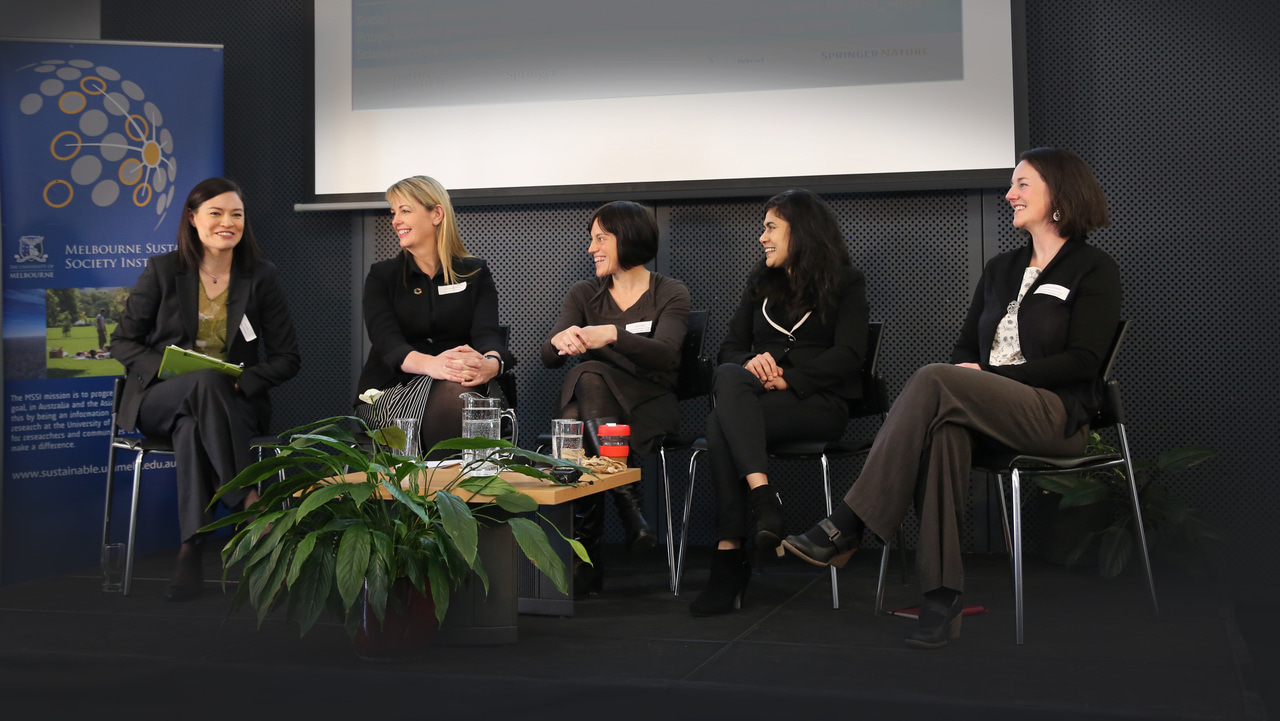On Tuesday 17 July we co-hosted the Australian launch of Nature Sustainability with the Melbourne Sustainable Society Institute (MSSI) at the University of Melbourne. We were very fortunate to have Chief Editor, Monica Contestabile, in attendance, alongside an invited panel from research and government to discuss the complex science/policy interface related to sustainability and Grand Challenges.
Professor Brendan Gleeson, MSSI Director and author of the forthcoming Palgrave title Degrowth in the Suburbs, opened the day by deliberating upon the crucial role peer reviewed research can play in helping to combat climate change, manage water security, prevent pollution and feed the world. Brendan also touched on the challenges of disciplinary silos, institutional barriers and the need for better collaboration with policy makers – themes explored in greater detail throughout the morning.
Tanya Ha, award-winning environmentalist and science journalist, next took the stage to interview Monica about Nature Sustainability. Monica emphasised the journal’s aim of publishing interdisciplinary research that bridges the gap between science and the social sciences. As Monica reasoned, science is crucial but can no longer stand alone, and we need to better translate research in ways that can effectively inform behaviour and societal change. The importance of diversity in publishing and peer review was also discussed, and whilst Monica noted the journal is currently doing sufficiently well on gender balance, she would like to see more representation and coverage from the Global South. She also highlighted the importance of not only interdisciplinary – but also transdisciplinary – research, which includes ‘end users’ as collaborators in design and research processes for applied impact. Interactions of the physical sciences with the human world have left a somewhat ‘messy’ space – an environment where Springer Nature has recognised a need to tackle interdisciplinarity and embed the social sciences within the research design space. This alignment also responds to strong market demand for science that can inform decision making and shape policy.

An all-female panel then discussed what interdisciplinary research and evidence backed sustainable policies looks like in Australia. Professor Rebekah Brown, Director of the Monash Sustainable Development Institute spoke of the success in the water space of interdisciplinary research, where terminology like ‘water sensitive urban design’ is used in shaping policy and informing practitioners, and the Cooperative Research Centre for Water Sensitive Cities is changing the way we think of city design, building and management.
Kath Rowley from Victoria's Department of Environment, Land, Water and Planning (DELWP) talked about how governments are embracing change and interdisciplinary work, such as via the integration of health outcomes with a modernised Environment Protection Authority. Kath also noted how DELWP is working closely with scientists at CSIRO to obtain more granular climate projections (reducing current projections of 100x100 square kms to only 5x5 square kms).
Dr Robyn Schofield, Director of Melbourne University’s Environmental Science Hub, drew attention to the fact that health outcomes are also significant when it comes the things we can’t see, such as the alarmingly high methyl mercury depositions in Antarctica (resulting from human intrusion of atmospheric systems in other parts of the world). Yet Robyn also spoke of the positive outcomes for both human health and the planet’s climate after the 1987 Montreal Protocol on Substances that Deplete the Ozone Layer.
Professor Veena Sahajwalla, Director of the UNSW SM@RT Centre for Sustainable Materials Research and Technology, Councillor on the Australian Climate Council and judge on the ABC television show The New Inventors, explained that we need to focus more on manufacturing methods and, “put our heads and hearts together for better impact”. Many items headed for landfill need to be redirected as there are enormous opportunities in recycling or reusing waste products. Veena, who pioneered the revolutionary green steel process (which converts old rubber tyres to metal alloys), revealed that the amount of copper in e-waste can be more than 10 times that of the original mined material, and in the case of gold, more than 40 times raw gold ore!

The panel, although all from different institutional backgrounds, agreed that interdisciplinary research is often stymied by issues of inadequate funding, or by institutional metrics that reward the individual over the interdisciplinary team. And whilst we are generally good at innovation, the challenge of building capability and insight to retire unsustainable practices was agreed upon by all panelists as being a ‘wicked problem’ in itself. Yet the panel was positive that momentum and demand continues to build for interdisciplinary research that can impact policy and provide real solutions to create more sustainable societies.
To end the event, all speakers were invited to imagine what the journal would look like in 10 years. The answers varied, but all held a similar vision – for a diverse, inclusive publication that would not only advise policymakers and industry on sustainable solutions, but also monitor and report on progress and practical implementation.
The launch itself was run sustainably. Attendees were provided with coffee keep-cups, all flyers were printed on recycled paper, the local Asylum Seeker Resource Centre provided catering, and a media team filmed the event, thus limiting the need to travel whilst also providing access to those unable to physically attend (highlights will shortly be featured on Springer Nature’s YouTube channel).




Please sign in or register for FREE
If you are a registered user on Research Communities by Springer Nature, please sign in